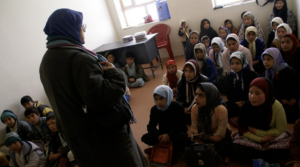A Year After the Taliban Took Over, Leadership Programs in Afghanistan Still Raise up Girls
On the morning of Aug. 15, 2021, seventeen-year-old athlete Farzana* woke up and prepared to run twenty kilometers down the streets of Kabul, as she did every morning. She was training for her upcoming track race competing with an all women’s team for the city of Kabul, Afghanistan.
As she walked to the door, her mother stopped her and told her she was not allowed to leave. “She told me that the Taliban would kill me if I left the house in the athletic clothes I was wearing,” Farzana said in an interview. “I got into an argument with my family because I did not believe them. I could not imagine that the Taliban had come.”
She did not believe it. As a teenager, Farzana was relatively independent. She had lived in Kabul since she was six with her seven siblings. Ever since her father died five years ago, her mother had supported their family. Farzana went to school and did extracurricular activities, such as running and participating in a program with a local NGO that works on leadership development for Afghan youth. She joined the program when she was in kindergarten. (For security purposes, the NGO will go unnamed).
“My family and I moved to Kabul because of our poverty,” she said. “We lived in a place that fed and sheltered poor people. That is where I began my education. In kindergarten, I went to [the program] at the recommendation of one of my cousins. At that point, the NGO provided social activities and social programs. I found myself being taught how to be strong enough to first change myself, then my family, and then I can change the rest of my community.”
In 2017, Farzana was a founding participant in a new program created by the NGO, based on the principle that women and girls can help and learn from each other, while supporting one another.
Not only does the program provide a safe space for girls to learn and empower each other, it also allows the transfer of information to other girls outside of the program. “We wanted to have a program for girls to raise their voices and talk in a relaxed setting, which was different from other places,” Farzana said. “We wanted educational classes to help us to improve our lives and access the new world which we could transfer to other women.”
Many girls were accepted into the new program, especially those who had few resources for extracurricular activities outside of the NGO. “In Afghanistan, most families are poor and cannot support girls in their family,” said Farzana. “In my family, no one is educated so they can’t help me with my studies. The NGO program helped me to continue my school lessons. Now, I am in first position at my school.”
As the program grew to include support groups, educational classes, vocational training and public speaking, Farzana took on a leadership role as a senior member and began mentoring younger participants.
She became a particularly strong leader in the athletics program, which gave the girls the opportunity to run competitively in Kabul. “It was the biggest happiness for me,” she said. “We had a lot of achievements in sports competitions. A few of our trainees participated in a race and were selected as runners for the national running team of Afghanistan.”
However, she says that the most meaningful course so far has been the NGO’s leadership program, in which girls learn how to change the community around them. “Every week we learn how we can be a lesson for others while making people listen to us,” she said. “Our goal is to become active and powerful women. We learn what our rights are, how we can define our rights, how we can raise our voices, and how we can understand our feelings. These lessons are not just lessons for leadership, but life lessons as well. These lessons helped us to continue as powerful girls in society.”
Farzana planned to continue as a leader in the program as the NGO expanded the pilot to groups all around Afghanistan; she even dreamed of the day when the program could be introduced to girls all around the world. However, these goals were put on hold after the Taliban took over in Kabul.
*Farzana’s name has been changed for safety.
